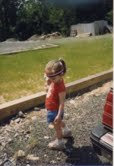Just now I tried searching for the New York Times article I read recently about the rise of occupational therapy - it didn't pop up - but instead I got a hit for an article about vision therapy ("Concocting a Cure for Kids with Issues," March 14 2010). It's a therapy that's not really respected by the medical field, or by other special education therapies (physical, occupational, speech, applied behavior analysis, etc.); the central tenet, as explained in the article, is that many of the learning problems diagnosed as A.D.H.D. and the like are, in fact, misdiagnoses that treat the symptoms and not the root of an underlying vision problem. To quote:
"...vision therapists often see children’s learning and attention problems as part of the high-pressure society that kids are forced to grow up in. While problems like A.D.H.D., dyslexia and other developmental or learning disorders are now seen by mainstream medicine as related to differences in brain structure, wiring and chemistry, the behavioral-optometry model conceives of achievement-related problems as resulting from the environment: notably, the stress of growing up in an unnatural and overly visually demanding world."
It goes on to say, "In this schema, vision therapy just undoes what culture has created. There’s nothing actually wrong with the child who’s struggling to learn or pay attention — his or her dysfunction has been caused by the outside world. This reasoning is filled with the promise that, with the right kind of care, any child can rise to any sort of opportunity."
What amazes me about the opposition to vision therapy and behavioral optometry is not that it exists - certainly every idea should be turned around, examined, and questioned - but that it all seems to be based on the argument, "Well, it's not scientific enough. You're not doing anything except making children and parents feel good about themselves." Example cited by critics: "...the low-power glasses that behavioral optometrists prescribe to reduce stress are so weak that they can’t actually have any effect on a child’s vision — except to make the child believe that they are helping his vision (or to please a parent who believes they are helping the child’s vision)."

The American Academy of Pediatrics says, “Ineffective, controversial methods of treatment such as vision therapy may give parents and teachers a false sense of security that a child’s learning difficulties are being addressed, may waste family and/or school resources and may delay proper instruction or remediation.”
As if feeling good about yourself is somehow a bad thing, a hinderance on "proper learning." What does that say about our idea of 'proper learning'? That it should be drudgery? That we should struggle and hate every moment of school in order to learn? (Obviously, if you have been reading so far you know my feelings on interest, engagement, and learning - and you know I disagree with drudgery for drudgery's sake.)
It would also help if children - people in general but children especially - were not seen as some sort of predicable scientific subjects. Science is a wonderful thing, and it is fascinating to know that no matter whether you heat it in a kettle or a pot, with a gas flame or an electric coil, water is water and will boil at 212 F. Or 100 C. Whichever. But people are not a hard science. People vary. Our emotions matter, and they are not measurable in degrees, Fahrenheit or Celsius. And, when I say our emotions matter, I mean that they absolutely affect the outcome of a situation. They cannot be disregarded or ignored, or treated like a variable in a science experiment.
What bothers me about the "scientific" argument is that it loses sight of the ultimate goal. The whole idea isn't to get kids to respond predictably to stimuli, like water to heat. The idea is to get kids to acquire and use literacy and mathematical skills. So what if they need 'magic glasses' to help them do it? It is hardly a "false sense of security" if the child actually makes strides in their academic life (or, as the article suggests, several areas of life, including sports and music). It is, rather, achieving the ultimate goal of the child being comfortable with academic skills.
This post ended up straying a bit from where I started - I want to get to the story about the "snake oil" of the title - but I think this is where I need to end for now. Certainly, it's a large and complicated enough topic to warrant revisiting. So here's to a bit of time to digest, with snake oil to come.

Please visit the site for the College of Optometrists in Vision Development to get the correct facts about vision therapy. http://www.covd.org/Home/NewYorkTimesReportonVisionTherapy/tabid/297/Default.aspx
ReplyDeleteIf the link doesn't work go to the "In the News" section and click on the New York Times.
Hi there,
ReplyDeleteThanks for finding my blog. Last year an optometrist visited my school and did a fantastic job presenting some of the childhood issues that might arise related to a vision problem - unfortunately, as thorough as she was, she was also using proper medical terminology and a lot of it fell through the o'l brain sieve. This has been a good reintroduction, so that I can better help my chilluns. :-)